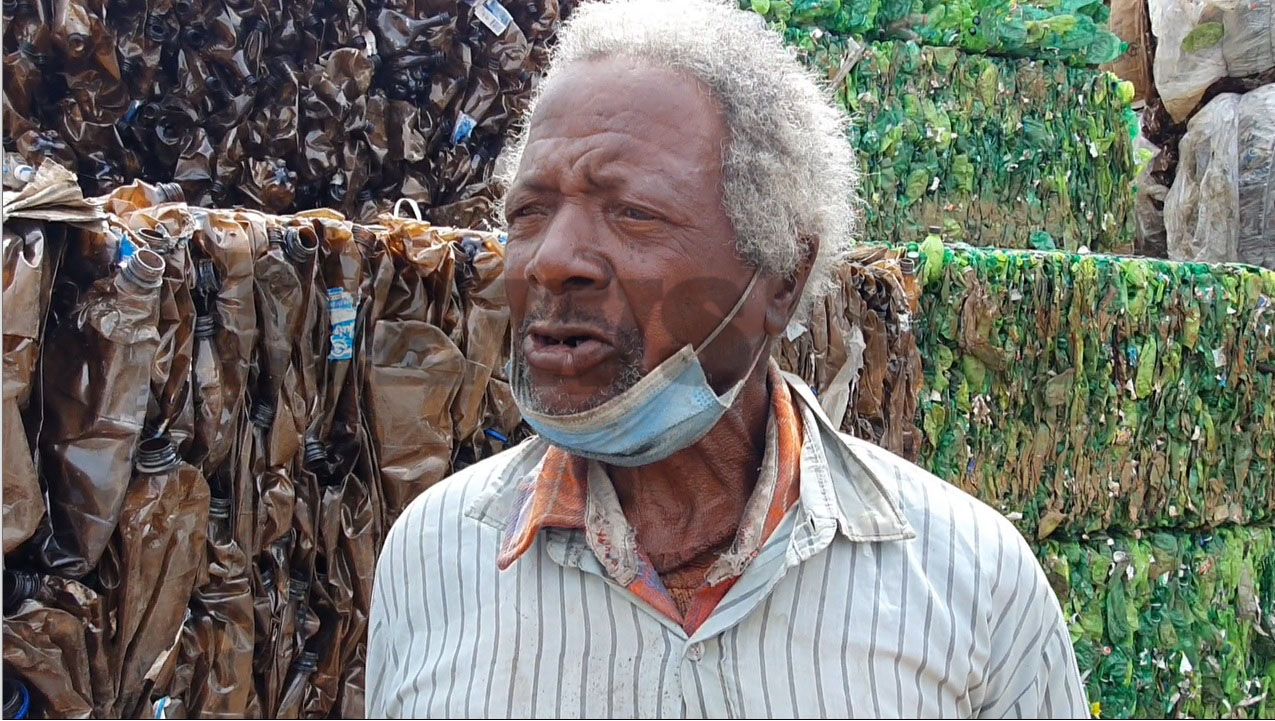
BY SILENCE MUGADZAWETA SEKURU George Sigauke braves the rains, rummaging through reeking heaps of garbage scattered around Mbare, Harare’s oldest suburb, for empty plastic bottles for recycling.
The old man appears sluggard and spiritless to many who rush past him on the streets. Having been homeless for over 20 years, calling Ardbennie shopping centre his home, he wishes life was different. He has no children to talk of, all five of them having disappeared into thin air without trace, an honest-to-goodness case of family estrangement. “I had five children, I’m not sure maybe they died or just disappeared into the world,” he says.

With no identification documents to confirm his age, name, or even village, Sekuru Sigauke only remembers his age. At 74, the visibly old man staggers carrying bulky bags of empty plastic bottles that he sells to recycling companies to earn a living.
Clad in tatty clothes, and their musty odour, the old man trudges to reach Petreco Zim Trading, a recycling company where he sells his daily pickings. He gets $50 per 15 kilogrammes, which he uses to buy food.
The old man goes into deep thought as he counts five $10 notes expressing dissatisfaction. You could read a book from his face, piles of sad stories manifesting. In a good week, Sekuru Sigauke delivers his wares three times.

He has a strange appearance, almost as if it was contrived. The old man tries to remember his youthful days, scratching his head in deep thought, but he can only retrieve snippets, as the rest has been wiped out. He has never benefited from government’s social services or the COVID-19 non-formal sector fund.
His memories are as cloudy as his eyes. The old man has one wish, only one wish: to get his pension and have a go at life. “If only I could get my pension, and as long as I can stand, I can make an effort to fend for myself,” he says. The desire to live still flares as bright as a star-flame.
- Chamisa under fire over US$120K donation
- Mavhunga puts DeMbare into Chibuku quarterfinals
- Pension funds bet on Cabora Bassa oilfields
- Councils defy govt fire tender directive
Keep Reading
He takes us through vivid memories of his employment history, which began when he was employed by the Rhodesian Wattle Co Ltd for five years. He says he later came to Mabelreign in Harare, where he worked for a white family for three years. For 37 years, he was employed by Phiona Smith doubling as a cook and gardener.
In his entire employment history, Sekuru Sigauke is bitter about the Smith family. He says they ran way without telling him, leaving him stranded and destitute. He wishes someone could help him locate the Smith family so he could claim what is due to him. “All I want know is how to find my former employer,” he adds.
As it stands, there are no close family members to look after him, or check on his health. The chapters of his life are written there to read: strength of character and memories of lost loves tinged with sadness because he is alone in the world now.

Sekuru Sigauke says he hails from Mutambara village in Chimanimani, and is of the Chihwa, Bonga totem.
Having last visited his rural home in 1951, he confesses that he was swallowed by the city. For years, Sekuru Sigauke has endured the vagaries of the weather living in the open.
The old man sleeps on an old car seat placed under a makeshift shade. He is a household name among vendors and people from the surrounding community. But many wish his relatives could come and take him home. They feel the man has suffered enough.
“It’s not easy for such an old man to be staying in the open. His relatives or children must come and take him. The man needs to rest,” says one homeless man, Nhamo Gwenzi. “We have been staying with him for more than 20 years, he is a good man,” he says.

“He used to be a strong man, but to imagine he now lives on bread crumbs, and leftovers thrown away by passers-by, it breaks my heart,” he adds with visibly teary eyes.
Sekuru Sigauke is not the only elderly person in this predicament, many lost their pension value due to the inflationary environment that prevailed in Zimbabwe over the last two decades.

While government provides free health services to senior citizens, State-provided medical services do not cover some medical conditions. Some with chronic illnesses may need services that are found outside the country and travelling to countries like India and South Africa, a pipe dream for people like Sekuru Sigauke.
Insurance and Pensions Commission (Ipec) commissioner Grace Muradzikwa says 80% of pensioners in Zimbabwe do not have medical cover, threatening assurance of good health in the elderly population.
With the country’s health institutions overwhelmed and dysfunctional due to poor governance, the elderly are so much vulnerable. This is due to the fact that “medical cover is normally provided during one’s working life as part of conditions of service, where the employer contributes a major portion or all of the medical aid premiums”.
Explains Muradzikwa: “Once this employer-employee relationship terminates at retirement, the employer may be unwilling to continue assuming this obligation.”
The Justice George Smith report published in March 2017 after an inquiry into the conversion of insurance and pension values from Zimbabwean dollars to United States dollars, after huge losses of value due to the hyperinflation, recommended that those who lost the value of their pension be compensated.
Compensation is to be based on assets that survived hyperinflation, giving pensioners and the affected reasonable benefit expectation. But to date, not much has been done and this is the reason why people like Sekuru Sigauke remain in that state.
Major findings from the report revealed that the government, insurance companies and the insurance regulatory body were responsible for the loss of value of pensions and insurance policies during that period.
Government’s mismanagement of the economy contributed 21%, the absence of a regulatory body 43%, and the predatory behaviour of the insurance industry 36%.
If the insurance companies remain steadfast, the issue is likely to die a natural death, especially in the case of Sekuru Sigauke, who doesn’t have any form of identification, and has blurred memory insofar as pension and insurance issues are concerned.
And with insurance companies saying they lost all records, as the Justice Smith report revealed, pensioners are bound to be on the receiving end. Many will never know when the insurance giants in Zimbabwe will own up and repay those who were affected.
Public Service, Labour and Social Welfare minister Paul Mavima says government has a programme to take people off the streets and put them in government institutions dotted across the country.
For people like Sekuru Sigauke, Mavima says his ministry is in the process of transferring responsibility from Public Service, Labour and Social Welfare minister to the Home Affairs ministry, which is supposed to make sure the homeless are placed in government institutions. As the world changes, extraordinary developments in technology, medicine and public hygiene over the last 100 years have resulted in an increasing number of people living longer than ever before, with better health and the prospect of a more active life long into old age.
This calls for governments to prepare and include the elderly in the development process. One of the strongest features of the United Nations Sustainable Development Goals is that older people should be part of the development process. Thus Zimbabwe has to revise its social policies to accommodate the elderly.
Follow Silence on Twitter @Mugadza40 [email protected]











